人教版(2019)选择性必修第二册Unit1Science and Scientists同步讲义(学案无答案)
文档属性
| 名称 | 人教版(2019)选择性必修第二册Unit1Science and Scientists同步讲义(学案无答案) |
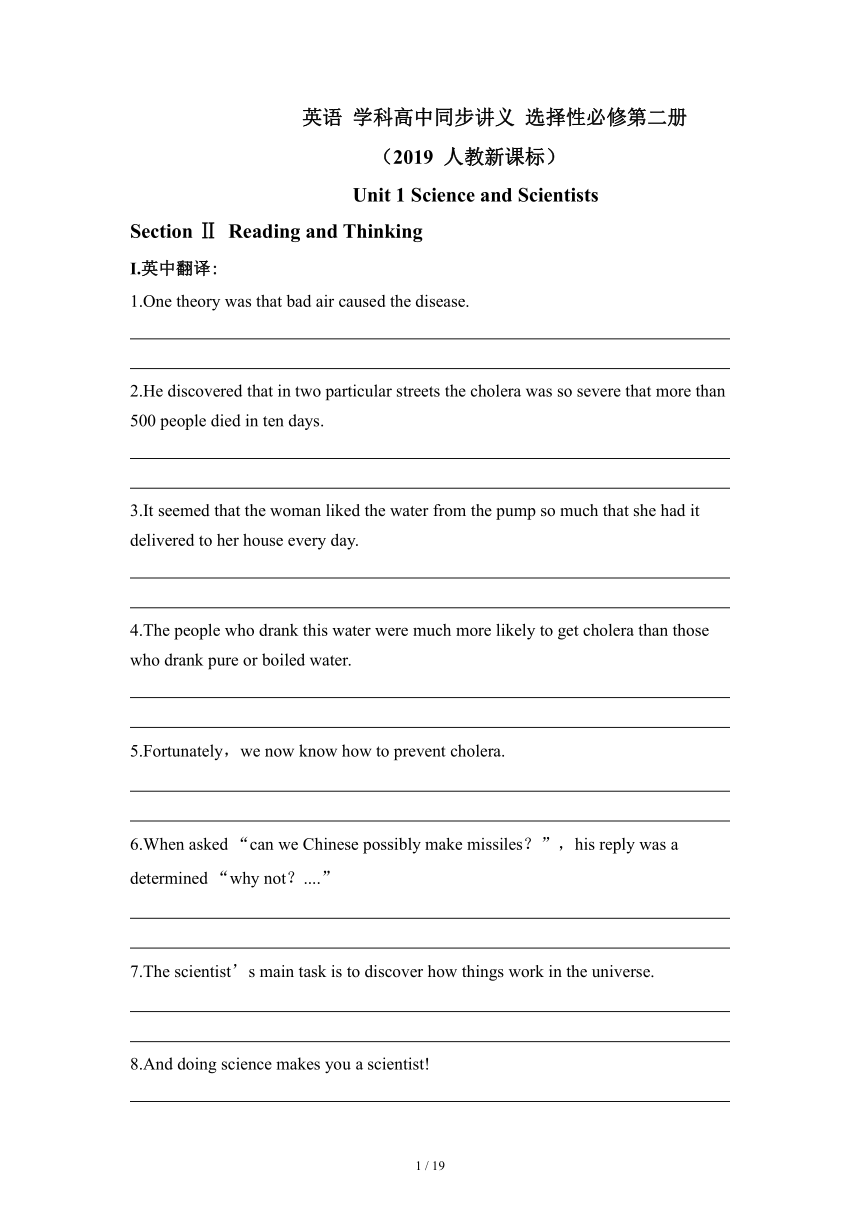
|
|
| 格式 | zip | ||
| 文件大小 | 127.7KB | ||
| 资源类型 | 教案 | ||
| 版本资源 | 人教版(2019) | ||
| 科目 | 英语 | ||
| 更新时间 | 2022-02-18 00:00:00 | ||
图片预览

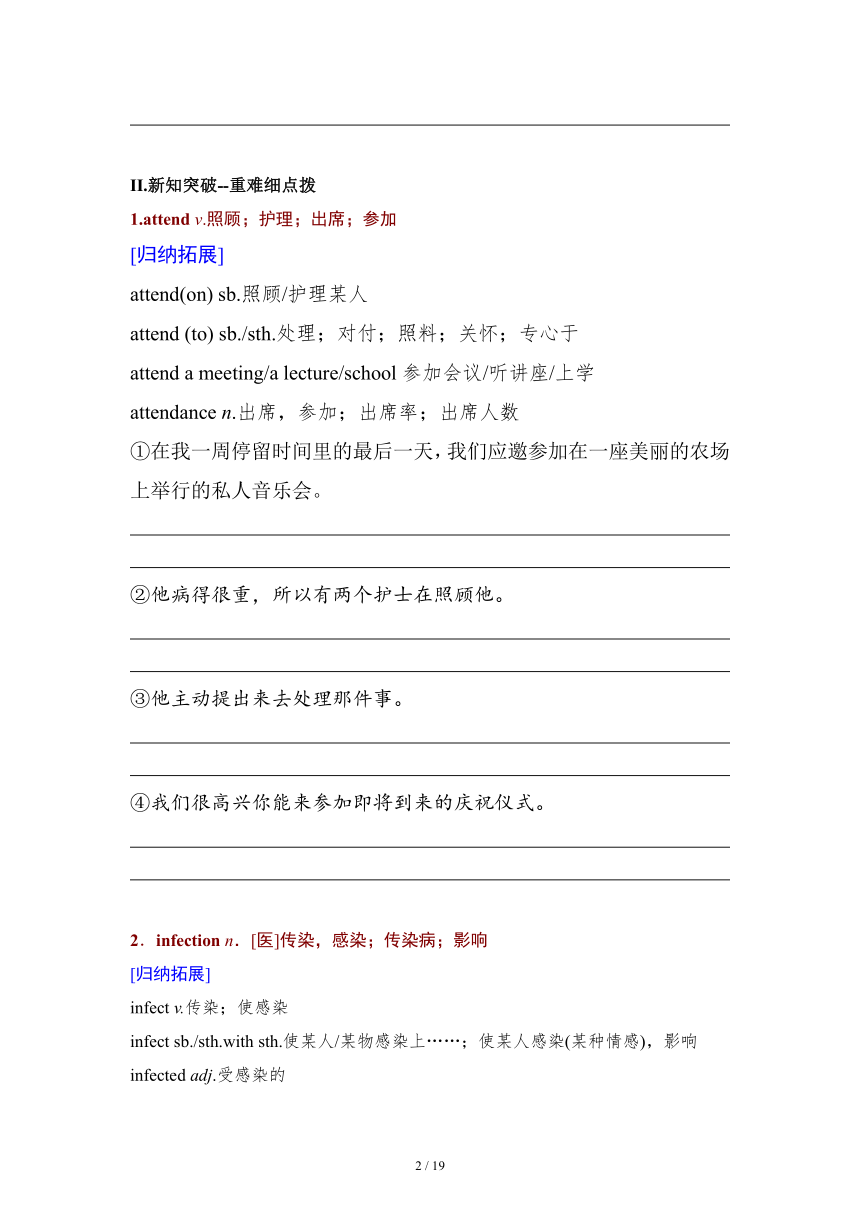
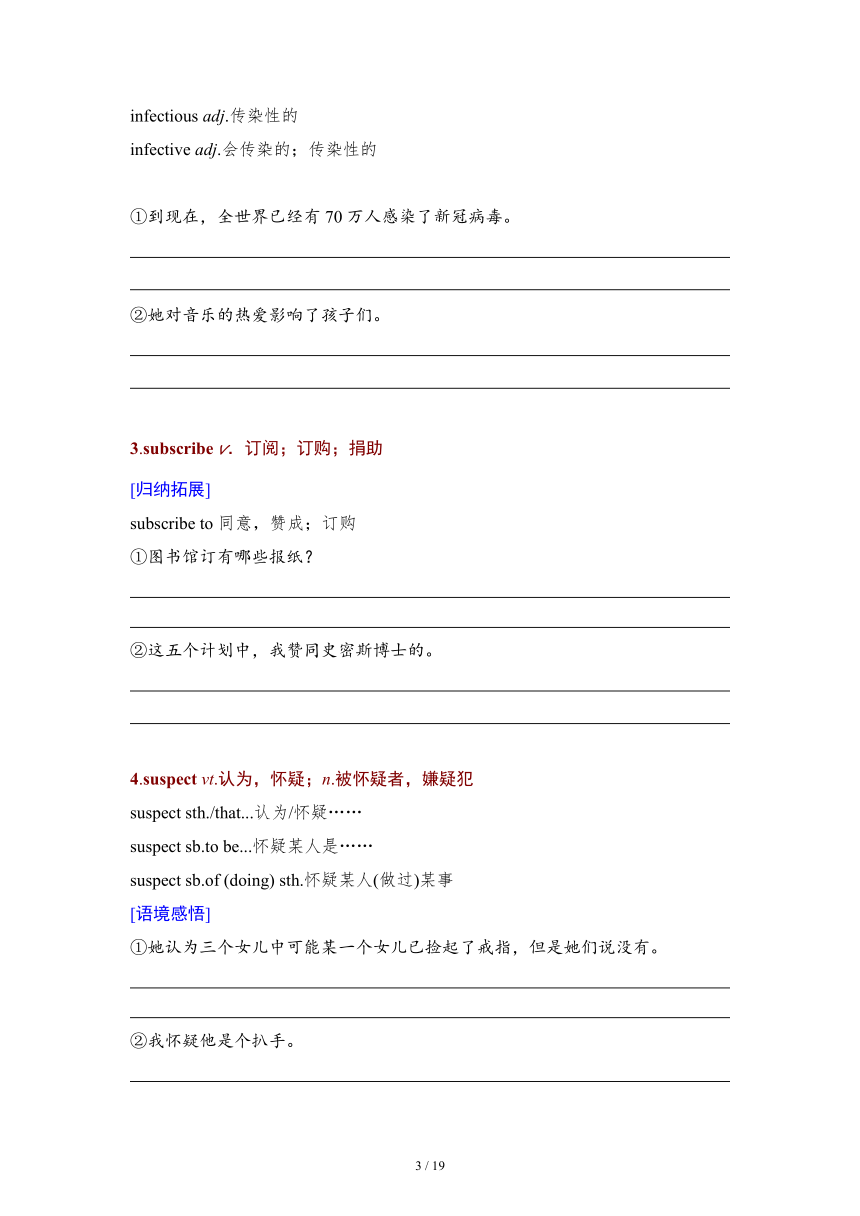
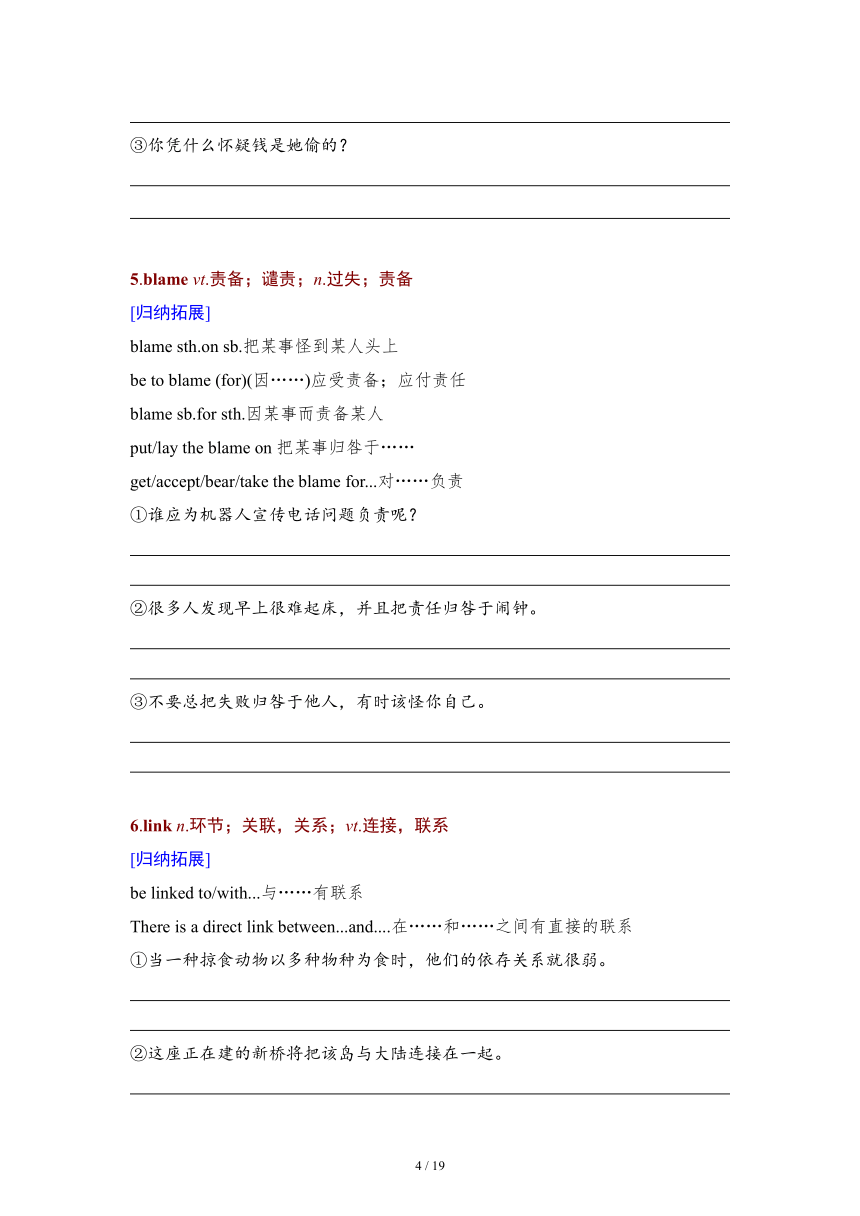
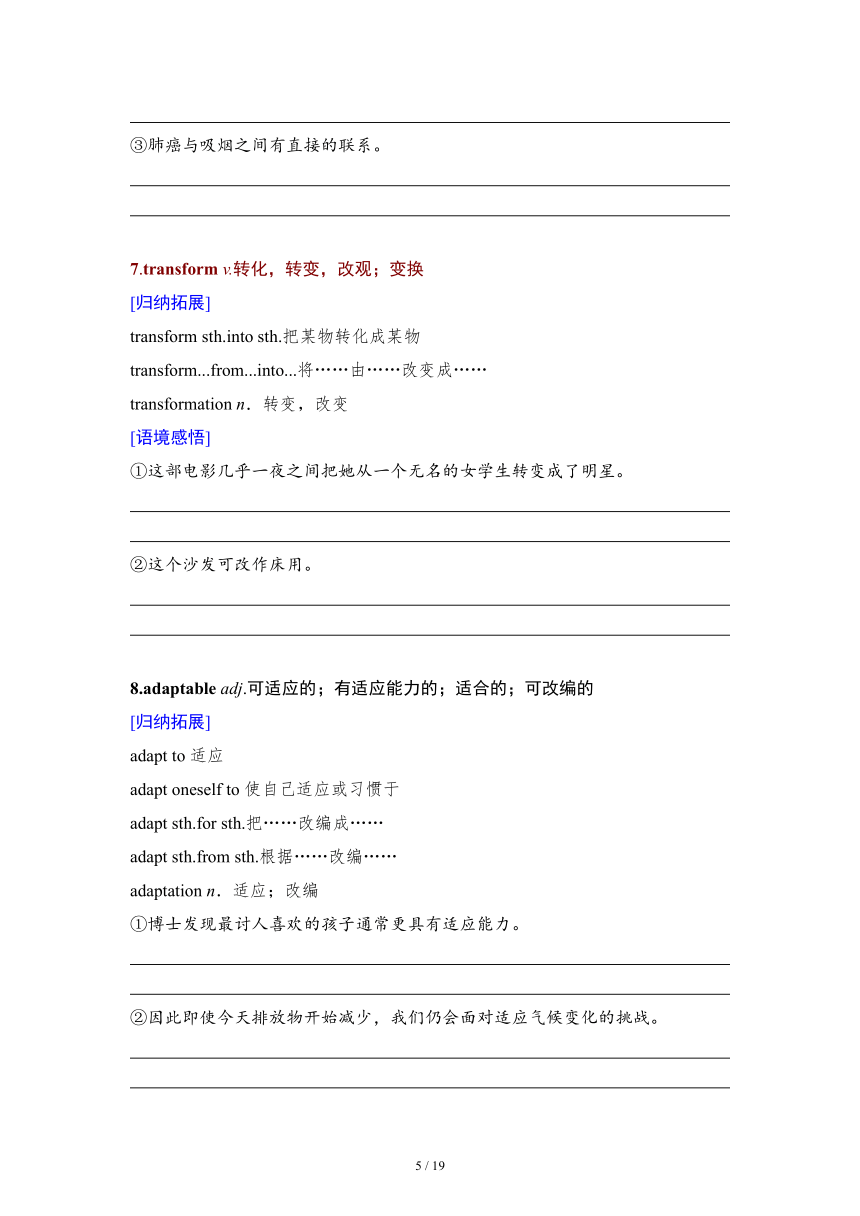
文档简介
英语 学科高中同步讲义 选择性必修第二册
(2019 人教新课标)
Unit 1 Science and Scientists
Section Ⅱ Reading and Thinking
I.英中翻译:
1.One theory was that bad air caused the disease.
2.He discovered that in two particular streets the cholera was so severe that more than 500 people died in ten days.
3.It seemed that the woman liked the water from the pump so much that she had it delivered to her house every day.
4.The people who drank this water were much more likely to get cholera than those who drank pure or boiled water.
5.Fortunately,we now know how to prevent cholera.
6.When asked “can we Chinese possibly make missiles?”,his reply was a determined “why not?....”
7.The scientist’s main task is to discover how things work in the universe.
8.And doing science makes you a scientist!
II.新知突破--重难细点拨
1.attend v.照顾;护理;出席;参加
[归纳拓展]
attend(on) sb.照顾/护理某人
attend (to) sb./sth.处理;对付;照料;关怀;专心于
attend a meeting/a lecture/school参加会议/听讲座/上学
attendance n.出席,参加;出席率;出席人数
①在我一周停留时间里的最后一天,我们应邀参加在一座美丽的农场上举行的私人音乐会。
②他病得很重,所以有两个护士在照顾他。
③他主动提出来去处理那件事。
④我们很高兴你能来参加即将到来的庆祝仪式。
2.infection n.[医]传染,感染;传染病;影响
[归纳拓展]
infect v.传染;使感染
infect sb./sth.with sth.使某人/某物感染上……;使某人感染(某种情感),影响
infected adj.受感染的
infectious adj.传染性的
infective adj.会传染的;传染性的
①到现在,全世界已经有70万人感染了新冠病毒。
②她对音乐的热爱影响了孩子们。
3.subscribe v.订阅;订购;捐助
[归纳拓展]
subscribe to同意,赞成;订购
①图书馆订有哪些报纸?
②这五个计划中,我赞同史密斯博士的。
4.suspect vt.认为,怀疑;n.被怀疑者,嫌疑犯
suspect sth./that...认为/怀疑……
suspect sb.to be...怀疑某人是……
suspect sb.of (doing) sth.怀疑某人(做过)某事
[语境感悟]
①她认为三个女儿中可能某一个女儿已捡起了戒指,但是她们说没有。
②我怀疑他是个扒手。
③你凭什么怀疑钱是她偷的?
5.blame vt.责备;谴责;n.过失;责备
[归纳拓展]
blame sth.on sb.把某事怪到某人头上
be to blame (for)(因……)应受责备;应付责任
blame sb.for sth.因某事而责备某人
put/lay the blame on把某事归咎于……
get/accept/bear/take the blame for...对……负责
①谁应为机器人宣传电话问题负责呢?
②很多人发现早上很难起床,并且把责任归咎于闹钟。
③不要总把失败归咎于他人,有时该怪你自己。
6.link n.环节;关联,关系;vt.连接,联系
[归纳拓展]
be linked to/with...与……有联系
There is a direct link between...and....在……和……之间有直接的联系
①当一种掠食动物以多种物种为食时,他们的依存关系就很弱。
②这座正在建的新桥将把该岛与大陆连接在一起。
③肺癌与吸烟之间有直接的联系。
7.transform v.转化,转变,改观;变换
[归纳拓展]
transform sth.into sth.把某物转化成某物
transform...from...into...将……由……改变成……
transformation n.转变,改变
[语境感悟]
①这部电影几乎一夜之间把她从一个无名的女学生转变成了明星。
②这个沙发可改作床用。
8.adaptable adj.可适应的;有适应能力的;适合的;可改编的
[归纳拓展]
adapt to适应
adapt oneself to使自己适应或习惯于
adapt sth.for sth.把……改编成……
adapt sth.from sth.根据……改编……
adaptation n.适应;改编
①博士发现最讨人喜欢的孩子通常更具有适应能力。
②因此即使今天排放物开始减少,我们仍会面对适应气候变化的挑战。
③当一个人去一个新地方的时候,他需要尽快适应新环境。
④一部改编自郭敬明小说的新电影《爵迹》于2016年上映。
8.realize vt.领悟;了解;实现;实行
[归纳拓展]
(1)realise one's aim/hope实现某人的目标/愿望
(2)realistic adj.现实的;实际的;逼真的,栩栩如生的
(3)reality n.现实,事实
in reality事实上
turn...into reality把……变成现实
realization n.认识,饮食;实现
①毕竟,并非所有的人都意识到野生动物也有思想、感情……。
②他最终实现了他的愿望——学会了怎样拉小提琴。
③对于我们获胜的可能性,我们要实事求是。
④如果我们加倍努力,我们的梦想会变成现实。
9.prove v.证明;证实;证明是
[归纳拓展]
prove (to be)+n./adj.证明是,原来是,结果是,最终被发现是
prove sb.(to be)+n./adj.证明某人是……
prove sth.to sb.向某人证明某事
prove+that clause证明……
It is proved that...据证明……
proof n.证据;证明
①这足以证明了诚实守信的大有人在。
②然而这条铁路很快就被证明是一个巨大的成功。
③已经证明如果没有氧气,大脑就会死。
④事实证明这本书很受欢迎,它给了学生们动力和成就感。
10.provide vt.提供
[归纳拓展]
provide sb.with sth./provide sth.for sb.提供某人某物
provide for sb.提供生活所需
provided/providing that只要……
①再者,你有必要休息一下,这样可以为你提供足够的能量。
②人们想要的是一个能够给他们提供舒适生活的政府。
③她总是设法使她的孩子有饭吃,有衣穿。
④他们需要抚养七个孩子。
⑤公共交通为人们游览北京提供了低价位的出行方式。
11.break out
[归纳拓展]
break into tears/laughter/cheers突然大哭/大笑/欢呼起来
break in打断;闯入
break away from脱离;打破
break out(战争、火灾等)爆发,突然发生
break down(机器等)出故障;身体垮掉
break up拆散;分裂;解散
①新冠肺炎爆发时,许多志愿者去武汉以控制这种疾病。
②第二天,我闯进一户人家,偷了一台电视机和一台录像机。
③当玛丽看到她儿子对电脑游戏上瘾时突然大哭起来。
④她姐姐再也控制不住自己的情绪,捂着手绢呜咽起来。
12.defend vt.保卫;保护;防御,为……辩解;防守
[归纳拓展]
defend one's country保卫祖国
defend oneself自卫
defend...against/from保卫……;抵抗……;保护……不受……攻击
defence n.防御;保护;保卫,国防;防御物;辩护
defence works防御之事
in defence (of)保卫
the Department of Defence国防部
①法律允许人们在面对指控时为自己辩护。
②她后退几步,看上去有些吃惊,然后举起手,好像是在自卫。
13.in charge of负责
[归纳拓展]
charge (sb.)for sth.为……(向某人)收费/要价
charge sb.with sth.指控某人某事
in charge (of...)主管/看管/负责(……)
take charge of...负责/看管……
in/under the charge of...=in one's charge在……的掌管之下
free of charge免费
charge v.收费;控诉;n.主管;费用
①汤姆在老板不在时负责这家公司。
②我想知道这为期六周的课程你向我收费多少。
③曾经掌管这家公司的那个人被指控吸毒。
e down with患(病);染上(小病)
[归纳拓展]
come about发生
come on加油;到来
come out出来;出版;结果是
come to达到;谈到
When it comes to...当谈及……
come up(太阳)升起;发生;被提及
come up with sth.找到/提出某事(物)
①恐怕我得了流感。
②就是在我回到公寓时,我第一次遇到了我的新邻居。
15.above all首先,最重要的是
[归纳拓展]
in all 总共
first of all首先,第一
all in all总而言之
after all毕竟;究竟
①最重要的是,我们不应该浪费时间。
②总而言之,我和她妈妈看到她的进步很高兴。
③总共25.40英镑。
④毕竟,他只是一个五岁的孩子。
16.accomplish vt.完成;达到;实现
[归纳拓展]
accomplish a purpose达到目的
accomplish one's promise实现诺言
accomplishment n.成就,完成;成绩;才艺
accomplished adj.技艺高超的,熟练的,才华横溢的
[语境感悟]
①当今世界,大部分的工作是以团队的方式完成的。
②我们将继续努力以便完成“十三五”规划确定的各项任务。
③为达到目标,他制订了一个仔细的计划。
Section Ⅲ Discovering Useful Structures -名词性从句(Ⅰ)
一、概述
名词性从句是一种具有名词功能的非独立分句。它包括主语从句、宾语从句、表语从句和同位语从句。引导名词性从句的词共有四类,即:that类,在从句中既没有意义,也无任何功能,故引导宾语从句时可省略;whether/if类,在从句中有意义,译是“是否”,但无任何功能;代词类,即:what,which,who,whom,whose以及whatever,whichever,whoever,在句中每词有自己特殊意义,在从句中充当主语、宾语、表语、定语或宾语补足语;副词类,即:when,where,how和why,在句中每词有自己的特殊意义,在从句中充当状语,表示时间、地点、方式或原因。
二、分类精讲
Ⅰ.主语从句
作句子主语的从句叫主语从句。主语从句可直接放在句首,也可用形式主语it代替,而将主语从句放在句末。
1.that引导的主语从句
that引导主语从句时只起连接作用,没有实际意义,也不在从句中作任何成分。但是,that不能省略。
[归纳拓展]
that引导的从句作主语时,常用it作形式主语,以平衡句子。
①That the earth moves around the sun is known to all.众所周知,地球围绕太阳转。(从句作主语,谓语动词用单数形式。)
此句可改写为:It is known to all that the earth moves around the sun.
②It is possible that caffeine may cause birth defects in humans.咖啡猫有可能引起胎儿缺陷。
③It is certain that she will do well in her exam.可以肯定她会考得很好。
④It's said that Mr.Green has arrived in Beijing.据说格林先生已经到了北京。
⑤It's no surprise that our team has won the game.我们班赢了那场比赛并不令人惊奇。
完成句子
①________________(据说)over 200,000 people in America have been infected with COVID 19.
②________________(很有可能)the climate around the world will be hotter this year.
③________________(这是一件可惜的事)that he has hurt his leg in the match.
2.whether,if引导的主语从句
whether引导的主语从句既可以放在句首,也可以放在句末,但if引导的主语从句只能放在句末,前面需用it作形式主语。whether,if只起连接作用,在句中不作成分。
[归纳拓展]
whether/if引导的主语从句
条件 引导词 例句
句首 只用 whether Whether he will come is unknown.他是否来仍不知道。
it作形式 主语,主语 从句置于 句末 与or not 直接连用 只用whether It makes no difference whether or not he comes.他是否来无关紧要。
与表示选择 的or连用 只用whether It makes no difference whether he stays or leaves.他是留还是去无关紧要。
与or not不 直接连用 whether or if It makes no difference whether/if he comes or not.他是否来无关紧要。
①Whether you can succeed or not depends on how hard you work at it.
你能否成功取决于你努力的程度。(whether引导的主语从句放在句首。)
②It is unknown whether/if he has agreed to my plan.
不知道他是否已经同意了我的计划。(主语从句是whether/if he has agreed to my plan,it作形式主语。)
完成句子
①__________________(他是否出国)hasn't been decided.
②__________________(是否……仍在讨论中)the old cinema should be pulled down for a park or not.
③__________________(他是否来与or not直接连用) is unknown yet.
3.代词引导的主语从句
引导代词通常有:what,who,which,whose,whatever whoever和whichever,whose在名词性从句中作定语,修饰名词,译为“谁的”,其他词在从句中作主语、宾语、表语。
[归纳拓展]
(1)用whoever,whatever或whichever引导的主语从句一般不用it作形式主语。
(2)what引导的名词性从句的单复数取决于其成分的含义。
①What he said just now is true.他刚才说的话是真的。(what在从句中作said的宾语)。
②Who will take charge of the company will be announced this afternoon.今天下午将宣布谁接管这个公司。(who在从句中作主语)
③Whoever breaks the law will be punished.王子犯法与庶民同罪。
④Whose article can win the first prize makes no difference.谁的文章能获得一等奖无关紧要。(whose在从句中作定语,修饰名词article)
⑤(改写④句)It makes no difference whose article can win the first prize.
改写句子
①Anything that my wife says is always right.→________my wife says is always right.
②Anyone who comes late will be punished.________________will be punished.
语法填空
③________the kid wanted was a new toy car.
④What they need________(be) a bed and some food.
4.副词引导的主语从句
引导副词常有:when,where,why和how,在从句中作状语,分别表示时间、地点、原因和方式。
[归纳拓展]
副词的选用比较复杂,在选取中要甄别从句的内容,看从句中已有的内容是时间、地点、方式或原因状语,缺的部分内容要有针对性地选取其中一个。
[语境感悟]
①When we will have a picnic depends on the weather.我们何时野餐视天气而定。(when在从句中作时间状语)。
②Why this kind of animals suddenly disappeared still remains a mystery.这种动物为什么突然消失还是个谜。(why在从句中作原因状语)。
③Where was Li Bai born is still uncertain.李白出生于何地仍不确定。(where在从句中作地点状语)
④How we will go to the park will be decided this afternoon.我们怎样去公园将在下午做出决定。(how在从句中作方式状语)。
[即学活用]
完成句子
①________________(他住哪儿) is unknown to his classmates.
②____________________(他何时出国) hasn't been decided.
语法填空
③It hasn't been decided________he will come tomorrow afternoon.
④________he refused to come to my birthday party puzzled me.
Ⅱ.宾语从句
在主句中作宾语的从句叫宾语从句。除了作谓语动词的宾语之外,宾语从句也可作介词或形容的宾语。
1.that引导的宾语从句
that引导的宾语从句作及物动词、介词或形容词的宾语。
[归纳拓展]
(1)常跟名词从句的介词有in和except。
(2)其他名词性从句的介词后常用it来代替,再加宾语从句。
(3)如果宾语从句后有补足语,常采用it+补足语+宾语从句结构。
[语境感悟]
①We found that the least well liked teens had become more agressive over time toward their classmates.我们发现最不受欢迎的少年过一段时间会变得对他们的同学更具有攻击性。
②Do you know (that) he has joined the army 你知道他参军了吗?
③He is a good student except that he is a little careless.他是个好学生,就是有点粗心。
④I'm sure that he will come to help us.我相信他会来帮助我们的。
[即学活用]
完成句子
①He differs from his classmates__________________(在于他把空余时间用在了阅读上)。
②You may________________(依靠,相信) I shall always help you.
语法填空
③He has made________clear that he will not give in.
2.whether/if引导的宾语从句
whether/if引导的宾语从句作及物动词、介词或形容词的宾语。
[归纳拓展]
(1)与or not直接连用,只用whether。
(2)与or表示选择连用,只用whether。
(3)宾语从句为否定句时,只用if。
[语境感悟]
①Soon you will also question whether the voice you're hearing is actualy real.很快你就会怀疑你所听到的声音是否是真的。
②Please let me know whether you need help.请告诉我你是否需要帮助。
③I don't care if he doesn't come.我不在乎他是否来。
[即学活用]
完成句子
①I don't know____________________(他是否来)。
②I don't care____________________(他是去还是留)。
③I don't mind____________________(他不愿帮助我们)。
3.代词引导的宾语从句
引导名词性从句的代词有what,which,who,whom和whose以及whatever,whichever和whoever。其中what(ever) which(ever)在从句中可作主语、宾语和定语;who(ever)在从句作主语和宾语;whom只能在从句中作宾语,whose只能在从句中作定语。
[归纳拓展]
(1)what在从句中相当于the thing(s) which/that;
(2)whatever在从句中相当于anything that;
(3)who在从句中相当于the man/girl that/who;
(4)whoever在从句中相当于anyone who;
(5)whichever在从句中相当于anyone who或anything that;
(6)which引导的名词性从句通常有供挑选的选项。
[语境感悟]
①The old man has just got what he should have (got).这位老人得到了他本应该得到的东西。
②He struggled to explain what he heard in his head.他艰难地解释了他所听到的东西(音乐)。
③She will give whoever needs help warm support.她会给予任何需要帮助的人热情的支持。
④You can write about whatever topic you prefer.你可以写你喜欢的任何话题。
[即学活用]
改写句子
①I will give the reward to anyone who finds my keys.
→I will give the reward to________finds my keys.
②The man told me everything that he had seen.
→The old man told me________he had seen.
语法填空
③The gold medal will be awarded to________wins the first place in the bicycle race.
④We choose this hotel because the price for a night here is down to $20,half of________it used to charge.
4.副词引导的宾语从句
引导名词性从句的副词有when,where,how,why。
[归纳拓展]
(1)副词引导宾语从句在宾语从句中作状语。分别表示时间、地点、方式或原因。
(2)副词引导的名词性从句在主句中也可作介词的宾语。
[语境感悟]
①Jane moved aimlessly down the tree lined street,not knowing where she was heading.
Jane在绿树成荫的街道上漫无目的地走着,不知道要去哪里。
②I can’t imagine how he did it.我不能想象他是如何做的这件事。
③They couldn’t undersland why I refused it.他们不明白我为什么拒绝它。
[即学活用]
语法填空
①(2019·全国卷Ⅰ)I count twelve shakes of green from________________I stand.
②We must find out________Karl is coming,so we can book a room for him.
③—I wonder________Mary has kept her figure after all these years.—By working out every day.
④You have to know________you are going if you are to plan the best way of getting there.
(2019 人教新课标)
Unit 1 Science and Scientists
Section Ⅱ Reading and Thinking
I.英中翻译:
1.One theory was that bad air caused the disease.
2.He discovered that in two particular streets the cholera was so severe that more than 500 people died in ten days.
3.It seemed that the woman liked the water from the pump so much that she had it delivered to her house every day.
4.The people who drank this water were much more likely to get cholera than those who drank pure or boiled water.
5.Fortunately,we now know how to prevent cholera.
6.When asked “can we Chinese possibly make missiles?”,his reply was a determined “why not?....”
7.The scientist’s main task is to discover how things work in the universe.
8.And doing science makes you a scientist!
II.新知突破--重难细点拨
1.attend v.照顾;护理;出席;参加
[归纳拓展]
attend(on) sb.照顾/护理某人
attend (to) sb./sth.处理;对付;照料;关怀;专心于
attend a meeting/a lecture/school参加会议/听讲座/上学
attendance n.出席,参加;出席率;出席人数
①在我一周停留时间里的最后一天,我们应邀参加在一座美丽的农场上举行的私人音乐会。
②他病得很重,所以有两个护士在照顾他。
③他主动提出来去处理那件事。
④我们很高兴你能来参加即将到来的庆祝仪式。
2.infection n.[医]传染,感染;传染病;影响
[归纳拓展]
infect v.传染;使感染
infect sb./sth.with sth.使某人/某物感染上……;使某人感染(某种情感),影响
infected adj.受感染的
infectious adj.传染性的
infective adj.会传染的;传染性的
①到现在,全世界已经有70万人感染了新冠病毒。
②她对音乐的热爱影响了孩子们。
3.subscribe v.订阅;订购;捐助
[归纳拓展]
subscribe to同意,赞成;订购
①图书馆订有哪些报纸?
②这五个计划中,我赞同史密斯博士的。
4.suspect vt.认为,怀疑;n.被怀疑者,嫌疑犯
suspect sth./that...认为/怀疑……
suspect sb.to be...怀疑某人是……
suspect sb.of (doing) sth.怀疑某人(做过)某事
[语境感悟]
①她认为三个女儿中可能某一个女儿已捡起了戒指,但是她们说没有。
②我怀疑他是个扒手。
③你凭什么怀疑钱是她偷的?
5.blame vt.责备;谴责;n.过失;责备
[归纳拓展]
blame sth.on sb.把某事怪到某人头上
be to blame (for)(因……)应受责备;应付责任
blame sb.for sth.因某事而责备某人
put/lay the blame on把某事归咎于……
get/accept/bear/take the blame for...对……负责
①谁应为机器人宣传电话问题负责呢?
②很多人发现早上很难起床,并且把责任归咎于闹钟。
③不要总把失败归咎于他人,有时该怪你自己。
6.link n.环节;关联,关系;vt.连接,联系
[归纳拓展]
be linked to/with...与……有联系
There is a direct link between...and....在……和……之间有直接的联系
①当一种掠食动物以多种物种为食时,他们的依存关系就很弱。
②这座正在建的新桥将把该岛与大陆连接在一起。
③肺癌与吸烟之间有直接的联系。
7.transform v.转化,转变,改观;变换
[归纳拓展]
transform sth.into sth.把某物转化成某物
transform...from...into...将……由……改变成……
transformation n.转变,改变
[语境感悟]
①这部电影几乎一夜之间把她从一个无名的女学生转变成了明星。
②这个沙发可改作床用。
8.adaptable adj.可适应的;有适应能力的;适合的;可改编的
[归纳拓展]
adapt to适应
adapt oneself to使自己适应或习惯于
adapt sth.for sth.把……改编成……
adapt sth.from sth.根据……改编……
adaptation n.适应;改编
①博士发现最讨人喜欢的孩子通常更具有适应能力。
②因此即使今天排放物开始减少,我们仍会面对适应气候变化的挑战。
③当一个人去一个新地方的时候,他需要尽快适应新环境。
④一部改编自郭敬明小说的新电影《爵迹》于2016年上映。
8.realize vt.领悟;了解;实现;实行
[归纳拓展]
(1)realise one's aim/hope实现某人的目标/愿望
(2)realistic adj.现实的;实际的;逼真的,栩栩如生的
(3)reality n.现实,事实
in reality事实上
turn...into reality把……变成现实
realization n.认识,饮食;实现
①毕竟,并非所有的人都意识到野生动物也有思想、感情……。
②他最终实现了他的愿望——学会了怎样拉小提琴。
③对于我们获胜的可能性,我们要实事求是。
④如果我们加倍努力,我们的梦想会变成现实。
9.prove v.证明;证实;证明是
[归纳拓展]
prove (to be)+n./adj.证明是,原来是,结果是,最终被发现是
prove sb.(to be)+n./adj.证明某人是……
prove sth.to sb.向某人证明某事
prove+that clause证明……
It is proved that...据证明……
proof n.证据;证明
①这足以证明了诚实守信的大有人在。
②然而这条铁路很快就被证明是一个巨大的成功。
③已经证明如果没有氧气,大脑就会死。
④事实证明这本书很受欢迎,它给了学生们动力和成就感。
10.provide vt.提供
[归纳拓展]
provide sb.with sth./provide sth.for sb.提供某人某物
provide for sb.提供生活所需
provided/providing that只要……
①再者,你有必要休息一下,这样可以为你提供足够的能量。
②人们想要的是一个能够给他们提供舒适生活的政府。
③她总是设法使她的孩子有饭吃,有衣穿。
④他们需要抚养七个孩子。
⑤公共交通为人们游览北京提供了低价位的出行方式。
11.break out
[归纳拓展]
break into tears/laughter/cheers突然大哭/大笑/欢呼起来
break in打断;闯入
break away from脱离;打破
break out(战争、火灾等)爆发,突然发生
break down(机器等)出故障;身体垮掉
break up拆散;分裂;解散
①新冠肺炎爆发时,许多志愿者去武汉以控制这种疾病。
②第二天,我闯进一户人家,偷了一台电视机和一台录像机。
③当玛丽看到她儿子对电脑游戏上瘾时突然大哭起来。
④她姐姐再也控制不住自己的情绪,捂着手绢呜咽起来。
12.defend vt.保卫;保护;防御,为……辩解;防守
[归纳拓展]
defend one's country保卫祖国
defend oneself自卫
defend...against/from保卫……;抵抗……;保护……不受……攻击
defence n.防御;保护;保卫,国防;防御物;辩护
defence works防御之事
in defence (of)保卫
the Department of Defence国防部
①法律允许人们在面对指控时为自己辩护。
②她后退几步,看上去有些吃惊,然后举起手,好像是在自卫。
13.in charge of负责
[归纳拓展]
charge (sb.)for sth.为……(向某人)收费/要价
charge sb.with sth.指控某人某事
in charge (of...)主管/看管/负责(……)
take charge of...负责/看管……
in/under the charge of...=in one's charge在……的掌管之下
free of charge免费
charge v.收费;控诉;n.主管;费用
①汤姆在老板不在时负责这家公司。
②我想知道这为期六周的课程你向我收费多少。
③曾经掌管这家公司的那个人被指控吸毒。
e down with患(病);染上(小病)
[归纳拓展]
come about发生
come on加油;到来
come out出来;出版;结果是
come to达到;谈到
When it comes to...当谈及……
come up(太阳)升起;发生;被提及
come up with sth.找到/提出某事(物)
①恐怕我得了流感。
②就是在我回到公寓时,我第一次遇到了我的新邻居。
15.above all首先,最重要的是
[归纳拓展]
in all 总共
first of all首先,第一
all in all总而言之
after all毕竟;究竟
①最重要的是,我们不应该浪费时间。
②总而言之,我和她妈妈看到她的进步很高兴。
③总共25.40英镑。
④毕竟,他只是一个五岁的孩子。
16.accomplish vt.完成;达到;实现
[归纳拓展]
accomplish a purpose达到目的
accomplish one's promise实现诺言
accomplishment n.成就,完成;成绩;才艺
accomplished adj.技艺高超的,熟练的,才华横溢的
[语境感悟]
①当今世界,大部分的工作是以团队的方式完成的。
②我们将继续努力以便完成“十三五”规划确定的各项任务。
③为达到目标,他制订了一个仔细的计划。
Section Ⅲ Discovering Useful Structures -名词性从句(Ⅰ)
一、概述
名词性从句是一种具有名词功能的非独立分句。它包括主语从句、宾语从句、表语从句和同位语从句。引导名词性从句的词共有四类,即:that类,在从句中既没有意义,也无任何功能,故引导宾语从句时可省略;whether/if类,在从句中有意义,译是“是否”,但无任何功能;代词类,即:what,which,who,whom,whose以及whatever,whichever,whoever,在句中每词有自己特殊意义,在从句中充当主语、宾语、表语、定语或宾语补足语;副词类,即:when,where,how和why,在句中每词有自己的特殊意义,在从句中充当状语,表示时间、地点、方式或原因。
二、分类精讲
Ⅰ.主语从句
作句子主语的从句叫主语从句。主语从句可直接放在句首,也可用形式主语it代替,而将主语从句放在句末。
1.that引导的主语从句
that引导主语从句时只起连接作用,没有实际意义,也不在从句中作任何成分。但是,that不能省略。
[归纳拓展]
that引导的从句作主语时,常用it作形式主语,以平衡句子。
①That the earth moves around the sun is known to all.众所周知,地球围绕太阳转。(从句作主语,谓语动词用单数形式。)
此句可改写为:It is known to all that the earth moves around the sun.
②It is possible that caffeine may cause birth defects in humans.咖啡猫有可能引起胎儿缺陷。
③It is certain that she will do well in her exam.可以肯定她会考得很好。
④It's said that Mr.Green has arrived in Beijing.据说格林先生已经到了北京。
⑤It's no surprise that our team has won the game.我们班赢了那场比赛并不令人惊奇。
完成句子
①________________(据说)over 200,000 people in America have been infected with COVID 19.
②________________(很有可能)the climate around the world will be hotter this year.
③________________(这是一件可惜的事)that he has hurt his leg in the match.
2.whether,if引导的主语从句
whether引导的主语从句既可以放在句首,也可以放在句末,但if引导的主语从句只能放在句末,前面需用it作形式主语。whether,if只起连接作用,在句中不作成分。
[归纳拓展]
whether/if引导的主语从句
条件 引导词 例句
句首 只用 whether Whether he will come is unknown.他是否来仍不知道。
it作形式 主语,主语 从句置于 句末 与or not 直接连用 只用whether It makes no difference whether or not he comes.他是否来无关紧要。
与表示选择 的or连用 只用whether It makes no difference whether he stays or leaves.他是留还是去无关紧要。
与or not不 直接连用 whether or if It makes no difference whether/if he comes or not.他是否来无关紧要。
①Whether you can succeed or not depends on how hard you work at it.
你能否成功取决于你努力的程度。(whether引导的主语从句放在句首。)
②It is unknown whether/if he has agreed to my plan.
不知道他是否已经同意了我的计划。(主语从句是whether/if he has agreed to my plan,it作形式主语。)
完成句子
①__________________(他是否出国)hasn't been decided.
②__________________(是否……仍在讨论中)the old cinema should be pulled down for a park or not.
③__________________(他是否来与or not直接连用) is unknown yet.
3.代词引导的主语从句
引导代词通常有:what,who,which,whose,whatever whoever和whichever,whose在名词性从句中作定语,修饰名词,译为“谁的”,其他词在从句中作主语、宾语、表语。
[归纳拓展]
(1)用whoever,whatever或whichever引导的主语从句一般不用it作形式主语。
(2)what引导的名词性从句的单复数取决于其成分的含义。
①What he said just now is true.他刚才说的话是真的。(what在从句中作said的宾语)。
②Who will take charge of the company will be announced this afternoon.今天下午将宣布谁接管这个公司。(who在从句中作主语)
③Whoever breaks the law will be punished.王子犯法与庶民同罪。
④Whose article can win the first prize makes no difference.谁的文章能获得一等奖无关紧要。(whose在从句中作定语,修饰名词article)
⑤(改写④句)It makes no difference whose article can win the first prize.
改写句子
①Anything that my wife says is always right.→________my wife says is always right.
②Anyone who comes late will be punished.________________will be punished.
语法填空
③________the kid wanted was a new toy car.
④What they need________(be) a bed and some food.
4.副词引导的主语从句
引导副词常有:when,where,why和how,在从句中作状语,分别表示时间、地点、原因和方式。
[归纳拓展]
副词的选用比较复杂,在选取中要甄别从句的内容,看从句中已有的内容是时间、地点、方式或原因状语,缺的部分内容要有针对性地选取其中一个。
[语境感悟]
①When we will have a picnic depends on the weather.我们何时野餐视天气而定。(when在从句中作时间状语)。
②Why this kind of animals suddenly disappeared still remains a mystery.这种动物为什么突然消失还是个谜。(why在从句中作原因状语)。
③Where was Li Bai born is still uncertain.李白出生于何地仍不确定。(where在从句中作地点状语)
④How we will go to the park will be decided this afternoon.我们怎样去公园将在下午做出决定。(how在从句中作方式状语)。
[即学活用]
完成句子
①________________(他住哪儿) is unknown to his classmates.
②____________________(他何时出国) hasn't been decided.
语法填空
③It hasn't been decided________he will come tomorrow afternoon.
④________he refused to come to my birthday party puzzled me.
Ⅱ.宾语从句
在主句中作宾语的从句叫宾语从句。除了作谓语动词的宾语之外,宾语从句也可作介词或形容的宾语。
1.that引导的宾语从句
that引导的宾语从句作及物动词、介词或形容词的宾语。
[归纳拓展]
(1)常跟名词从句的介词有in和except。
(2)其他名词性从句的介词后常用it来代替,再加宾语从句。
(3)如果宾语从句后有补足语,常采用it+补足语+宾语从句结构。
[语境感悟]
①We found that the least well liked teens had become more agressive over time toward their classmates.我们发现最不受欢迎的少年过一段时间会变得对他们的同学更具有攻击性。
②Do you know (that) he has joined the army 你知道他参军了吗?
③He is a good student except that he is a little careless.他是个好学生,就是有点粗心。
④I'm sure that he will come to help us.我相信他会来帮助我们的。
[即学活用]
完成句子
①He differs from his classmates__________________(在于他把空余时间用在了阅读上)。
②You may________________(依靠,相信) I shall always help you.
语法填空
③He has made________clear that he will not give in.
2.whether/if引导的宾语从句
whether/if引导的宾语从句作及物动词、介词或形容词的宾语。
[归纳拓展]
(1)与or not直接连用,只用whether。
(2)与or表示选择连用,只用whether。
(3)宾语从句为否定句时,只用if。
[语境感悟]
①Soon you will also question whether the voice you're hearing is actualy real.很快你就会怀疑你所听到的声音是否是真的。
②Please let me know whether you need help.请告诉我你是否需要帮助。
③I don't care if he doesn't come.我不在乎他是否来。
[即学活用]
完成句子
①I don't know____________________(他是否来)。
②I don't care____________________(他是去还是留)。
③I don't mind____________________(他不愿帮助我们)。
3.代词引导的宾语从句
引导名词性从句的代词有what,which,who,whom和whose以及whatever,whichever和whoever。其中what(ever) which(ever)在从句中可作主语、宾语和定语;who(ever)在从句作主语和宾语;whom只能在从句中作宾语,whose只能在从句中作定语。
[归纳拓展]
(1)what在从句中相当于the thing(s) which/that;
(2)whatever在从句中相当于anything that;
(3)who在从句中相当于the man/girl that/who;
(4)whoever在从句中相当于anyone who;
(5)whichever在从句中相当于anyone who或anything that;
(6)which引导的名词性从句通常有供挑选的选项。
[语境感悟]
①The old man has just got what he should have (got).这位老人得到了他本应该得到的东西。
②He struggled to explain what he heard in his head.他艰难地解释了他所听到的东西(音乐)。
③She will give whoever needs help warm support.她会给予任何需要帮助的人热情的支持。
④You can write about whatever topic you prefer.你可以写你喜欢的任何话题。
[即学活用]
改写句子
①I will give the reward to anyone who finds my keys.
→I will give the reward to________finds my keys.
②The man told me everything that he had seen.
→The old man told me________he had seen.
语法填空
③The gold medal will be awarded to________wins the first place in the bicycle race.
④We choose this hotel because the price for a night here is down to $20,half of________it used to charge.
4.副词引导的宾语从句
引导名词性从句的副词有when,where,how,why。
[归纳拓展]
(1)副词引导宾语从句在宾语从句中作状语。分别表示时间、地点、方式或原因。
(2)副词引导的名词性从句在主句中也可作介词的宾语。
[语境感悟]
①Jane moved aimlessly down the tree lined street,not knowing where she was heading.
Jane在绿树成荫的街道上漫无目的地走着,不知道要去哪里。
②I can’t imagine how he did it.我不能想象他是如何做的这件事。
③They couldn’t undersland why I refused it.他们不明白我为什么拒绝它。
[即学活用]
语法填空
①(2019·全国卷Ⅰ)I count twelve shakes of green from________________I stand.
②We must find out________Karl is coming,so we can book a room for him.
③—I wonder________Mary has kept her figure after all these years.—By working out every day.
④You have to know________you are going if you are to plan the best way of getting there.
